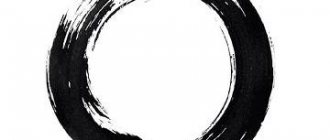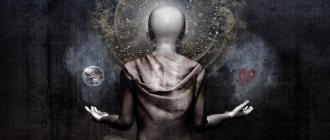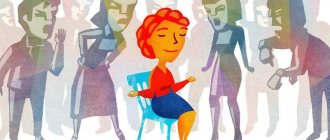The development of human knowledge occurs as a result of experimental activity, inferences, and the formation of concepts. However, for the progress of civilization, logic alone is not enough. Guessing, sudden insights inexplicable by common sense, are of great importance in the emergence of new knowledge.
Intuition gives new impetus and direction to the movement of thought. This is a phenomenon based on the ability to make the right decisions, bypassing intermediate stages of reasoning.
Since ancient times, intuition has been the subject of discussion among philosophers, psychologists, inventors and simply inquisitive citizens. Let's try to understand what intuition is and what role it plays in science and everyday life.
Definition
Intuition is (in philosophy) a way of knowing the truth through its direct observation without evidence. Intuitive solutions arise as a result of long thought about solving a problem.
Psychologists explain intuition by the activity of the subconscious. A person thinks for a long time, reflects on a problem, despairs of finding a solution, but it comes as if by itself, and unexpectedly. Psychology explains this by the continuation of mental activity at the subconscious level and the subsequent movement of the result of intellectual work into the sphere of consciousness. So intuition is (in psychology) knowledge that arises without awareness of the ways and conditions for obtaining it.
Intuitions do not include inferences whose premises are not stated explicitly. Also, behavioral reactions, which are based on instincts and physiological manifestations, are not intuition.
Main currents
In this direction, two main trends should be distinguished.
- The first movement, which was developed by the French philosopher Henri Bergson, is characterized by the opposition of intuitive feeling and intellectual reason. In this case, the intellect or intellectual mind is interpreted as an instrument of operation in their collision with dead things, which can also be called material objects, distributed in space. The position of the philosophy of life, which is developing in this period in Germany, is close to this current.
- The second movement appeared thanks to the research and reflections of Russian philosophers, namely Nikolai Onufrievich Lossky. BUT. Lossky does not contrast intellect and intuition, but, on the contrary, strives to unite them as knowledge, as a means.
Intuitionism, according to N.O. Lossky, is a doctrine of a certain cognized object, which may be a partial part of external worlds. Thus, the direct consciousness of the cognizing subject arises into a qualitative personality, and then will be understood as existing independently of the process of cognition and inquiry. BUT. Lossky notes three categories of intuition - sensual, intellectual and mystical.
Need advice from a teacher in this subject area? Ask a question to the teacher and get an answer in 15 minutes! Ask a Question
Historical development of the concept
The problem of intuition was of interest back in Antiquity. Thus, Plato argued that intuition is the contemplation of ideas. A person has absolute knowledge, but when he gets into the material world, he forgets about everything. Learning, discovering something new is remembering what was known before. Intuition helps you do this. We are not talking about passive perception, but about the suddenly revealed truth after long preparation of the mind.
Recognizing the phenomenon of intuition, Aristotle considered it insufficient to obtain reliable scientific knowledge. According to the scientist, true ideas about objects and phenomena of the surrounding world are formed as a result of sensory experience and deduction.
In the Middle Ages, attempts to scientifically explain intuition were made by Thomas Aquinas and William of Ockham. F. Aquinas saw the role of intuition in the organization of human thinking. W. Ockham identified simple and complex cognition. He attributed to the first the knowledge obtained through direct perception of objects and phenomena, to the second - the formation of concepts. Intuition manifests itself at the level of simple cognition, when the obvious is accepted without evidence.
The interpretation of the concept of “intuition” has changed in modern times. The rapid development of natural sciences has necessitated a revision of the theory of knowledge and the development of new methods for substantiating concepts and laws. Intuitive knowledge began to be seen as a way to a higher level of intellectual activity. This point of view was expressed by R. Descartes, B. Spinoza, G. Leibniz, I. Kant and others. Intuition is (in philosophy) the path to truth.
A. Bergson, O. Lossky, S. Frank created a new philosophical doctrine - intuitionism. The essence of the theory is that a person is open to understanding the world around him. An objectively existing cognizable object is reflected in the consciousness of the individual. Initial ideas about an object, formed through direct perception, are intuitive. This is not yet true knowledge, but the basis for rationalization and conclusions.
S. Frank identified contemplative intuition and intuitive knowledge. In the latter case, we mean a holistic, systemic perception of the world in the unity of knowledge and relationships of things. Intuition is a continuation of mental activity where logic is powerless.
At the beginning of the 20th century, the concept of “intuition” was excluded from scientific use. At that time, it was believed that knowledge about the world could only be obtained through logic. Later, intuition began to be viewed as insight, a guess, “a leap into the unknown” (S. Submaev, S. Mikhoels, etc.). The study of intuition has become relevant due to the development of the psychology of creativity. The famous psychologist Ya. A. Ponomarev created the doctrine of a by-product - an unexpected, but original and important result of creative activity, obtained as a result of the hard work of the subconscious. Intuition is the ability to find a non-standard solution to a problem.
Today, interpretations of intuition vary from “semi-conscious premonition” to “higher forms of creative thinking.” The complexity of studying the phenomenon is determined by the problematic nature of the description and logical analysis of what is illogical in nature.
Intuition in philosophy
In philosophical science initially there was not one accepted concept of intuition. Plato understood the intuitive process as intellectual knowledge that comes by sudden insight. Feuerbach interpreted intuition as sensory contemplation, and Bergson defined it as instinct. Views also differed on the divine and materialistic justification for the emergence of the phenomenon of intuition. From the point of view of divine theory, intuition is a blessing and a message that descends on a person from higher powers. In materialistic perception, it is believed that this is a special intuitive type of thinking, during which all the details and processes are not realized, but only the result of the necessary analysis. This is knowledge that does not need proof.
Attempts were made to identify the signs of intuitive knowledge, which boiled down to the absence of initial analysis and inferences, the independence of the conclusion from the proposed evidence and the presence of an undeniable belief in the correctness of the ideas. The intuitive method of cognition has not only completely different functioning mechanisms, but also a qualitatively different resulting product, having the following features:
— going beyond the standard framework of ideas and expanding the vision of the situation;
- the object of cognition is perceived as a whole, while its individual component parts are also noticed;
— it is possible to perceive the dynamics of change, rather than a static, frozen definition;
- lack of evidence of results, causes and connecting elements in explaining an intuitive decision.
Based on interest in the problems of intuitive knowledge of the world, a new movement of philosophy developed - intuitionism. It was founded in the nineteenth century by Henri Bergson, and the main essence was the opposition of intuition and intellect. On this basis, the mathematical and natural areas of scientific knowledge are separated, and art is especially considered separately, as a part of the activity of the human mind that is completely detached from reality.
This concept of opposition has received many critical reviews, and psychological science is most in demand for the opposite point of view about the unity of the intuitive and intellectual, as two components of one process.
Sensory and rational cognition
A person experiences the world through the senses (vision, hearing, smell, touch, taste) and through thinking. Sensory cognition makes it possible to obtain ideas about objects through their direct perception. Generalization, transfer of perceived signs and properties to other homogeneous objects does not occur. So, for a 1-2 year old child, a cup is only the cup from which he drinks. The baby can name an object, but the word does not yet perform a generalizing function.
Rational cognition is carried out using concepts, judgments and inferences: “a triangle is a geometric figure consisting of three segments connected by three points that do not lie on the same straight line”, “friction is a source of heat”, “all predators eat meat, a tiger is a predator , therefore, he eats meat,” etc.
Sensory and rational cognition are closely related. One or another type of cognitive activity becomes dominant depending on the specifics of the problem being solved. The form of pairing of the sensual and rational is intuition. It makes sense to talk about intuition when moving from the sensual to the rational, and vice versa. Unique images appear in a person’s mind, and new concepts are formed without preliminary conclusions. An example is the discovery of the formula for benzene by F. Kekule (a snake biting its tail).
Can we say that intuition is sensory knowledge? Yes, if we mean sensations and perceptions that are opposed to reason, but not devoid of it. Research results show that even elementary forms of sensory reflection of reality are mediated.
How to awaken and develop intuition
When the types of intuition are considered and what it is, I want to know how to awaken it. Before children begin to understand themselves and join society, they communicate with the world using their “sixth sense.” As you grow older, these skills are forgotten, but they can be regained.
Here are approximate training steps:
- the first is recalling intuitive experience and reproducing the sensations associated with it;
- the second is to turn off logic when entering a state of memories and ask yourself questions, listening to your inner voice.
Example. Cards with two colors on the back, turned over on the back, will help develop this ability. Before turning over the card, you must try to get a hint from your inner voice.
Important! A sign of developed intuition is considered to be bodily responses to questions that can be read after gaining experience.
You can awaken your intuition by doing the exercises shown in the picture below.
Exercises to awaken your intuition
Intuition can manifest itself in the form of tactile sensations, visual and acoustic images, or emotional changes. It is not for nothing that it is called the “sixth sense”; like any of the senses, it requires frequent use, otherwise it will atrophy.
Types of intuition
Intuition can be intellectual, sensual, emotional, mystical (inexplicable premonitions) and professional (technical, medical, artistic, etc.).
By the nature of its activity, intuition can be standardized and heuristic. For example, a doctor makes a correct diagnosis without first examining the patient. This is a standardized intuition, since the doctor does not invent anything new. It is appropriate to talk about heuristic intuition when the interaction of sensory images and abstract concepts occurs, as a result of which new images and concepts are formed.
Intuition and Science
Most scientific discoveries were made “by inspiration.” Thus, the idea of an alternating current electric motor came to Nikolai Tesla’s mind while admiring the sunset. The thought about the relativity of the speed of processes occurring in the world came to A. Einstein after waking up in the morning. D. A. Mendeleev saw the periodic table of elements in a dream. Psychologists and physiologists explain such phenomena as follows.
People with developed intuition have good long-term memory. Elements of past experience are linked into a system that exists both in consciousness and at the subconscious level.
The mechanism of intuition also includes an emotional component. The emotion that arises in the process of solving a problem affects the area of the brain responsible for long-term memory. Associations formed in this way contribute to the emergence of images, including original ones.
Thinking is closely related to speech. But there is also non-verbalized thinking. The speed of its occurrence is much higher, so the processing of information with the participation of this cognitive process proceeds much faster.
Making an intuitive decision is impossible without taking into account ethical, aesthetic and value factors. The success of scientific activity depends not only on intellectual and creative abilities, but also on the personality of the scientist.
The truth is beyond doubt to those to whom it has been revealed, but proof is required for the public to accept a new idea.
How does the sixth sense work?
Subconscious - what is it, definition
Every person at least once in his life has thought about the question: “Intuition - what is it and how does it work?” The mechanism through which intuitive processes take place has an individual direction. For example, the speed and frequency of intuitive decisions depend on a person’s personality, his emotional state, and impartiality of thinking.
The lack of information and lack of time for understanding are compensated by accumulated knowledge and experience in the field of the problem at hand. It would be wrong to consider intuitive guesses and logical conclusions as opposite processes. Most likely, these are two sides of one whole - the intellectual component of a person’s personality.
Intellectual component
Representatives of different disciplines of social science, when answering the question “how does intuition work?” are unanimous in their opinion: intuition is inextricably linked with the rise of energies: mental, physical and spiritual. This allows consciousness to expand the scope of perception and make intuitive discoveries.
Ways to expand consciousness
Conditions for the manifestation of intuition
Premonitions do not just happen. As a rule, it illuminates those who are well-versed in the profession, have deep scientific knowledge or relevant life experience.
The next condition is the presence of a problem. The subconscious begins to work where existing knowledge is not enough. Intuition is a step towards discovery. The subject really wants to resolve the issue, so he is in a state of thought. Intense mental activity continues until the clue is discovered.
People have long known that dogs salivate at the sight of meat, but only I. P. Pavlov was able to use this fact for scientific purposes. Apples have fallen on the heads of passers-by before, but only I. Newton succeeded in discovering the law of universal gravitation. The success of intuition depends on how much a person manages to get carried away by a problem, free himself from stereotypes and not lose hope of success.
Conclusion
Definition 1
Thus, intuitionism is a philosophical direction that puts into human destiny those necessary qualities and actions emanating from the person himself and his internal sensations, which are born under the influence of external factors, which, in turn, can be both favorable and Not good. But all these feelings and sensations are reflected in the soul and state of mind and state of the human personality.
Do you need to select material for your study work? Ask a question to the teacher and get an answer in 15 minutes! Ask a Question
Intuition and everyday life
Subconscious decision making is common to most people. Relying on intuition, we choose which university to enter, whether to trust a new acquaintance, and learn about a person’s condition from the voice from the telephone receiver. Intuition is a feeling that cannot be explained rationally.
Intuition should not be confused with desire. Desire is associated with need, and intuition is associated with experience. Thus, a cyclist understands how to turn the wheel on a certain section of the road in order to maintain balance. This is due to the previous fall. An experienced mother determines what the baby needs by the intonation of his crying. The desire to buy a new bag or boots is based not on a premonition, but on the need to be beautiful and not freeze in winter.
Spreading
Intuitionism in human ethics stood out in the 20th century as an independent philosophical movement, becoming especially widespread in Great Britain. The main representatives are George Moore, Charles Broad, David Ross and Alfred Young. In this direction, the problem of establishing and recognizing norms of morality and morality is considered. It should be mentioned that these norms cannot be derived from scientific knowledge about nature and man, and their comprehension is possible only through the prism of intuition.
Development in the field of intuitionism also belongs to the Russian philosophers S. L. Frank, E. N. Trubetskoy, the French neo-Thomists E. Gilson, J. Maritain and others, representatives of the German Phenomenological School M. Scheler, N. Hartmann.
Women's intuition: myth or reality?
It is generally accepted that intuition on an ordinary level is more pronounced in women. They are able to predict events, judge a person by their appearance, and understand their children and loved ones. In the Ancient World and the Middle Ages, it was believed that the fair sex had magical powers and could work miracles.
With the development of science, ideas about women changed, and relevant research was carried out. Thus, the American psychologist W. Argor discovered that women's intuition is not a myth. The ability to anticipate is formed on the basis of experience. Women have a wider circle of contacts, participate in conflict resolution and social activities. Success in interacting with people is impossible without sufficient flexibility and sensitivity.
Ladies understand facial expressions and gestures, body language better. This allows you to notice the discrepancy between the statements and non-verbal reactions of the interlocutor, and understand the person’s true intentions.
Development of intuition
While working on intuition, it is necessary to pay attention to the development of observation and improvement of the senses. Look carefully at objects, pay attention to what previously went unnoticed, analyze the sensations of delicious coffee, touching tree bark, a new velvet dress, etc. Try to imagine a yellow sound or an enterprising chest of drawers. What feelings arise from such associations?
Good results are obtained by auto-training, a break from everyday worries, attempts to predict the events of the current day, the text of an unread letter, and determine who is calling on the phone before picking up the phone. Servants of Eastern cults use meditation to free the mind.
Intuition is the ability to comprehend the truth, but you should not overly trust your sixth sense. Sometimes it fails, and a person pays for mistakes. In both science and life, intuitive decisions should be tested by logic or experience.
Intuition in psychology
In psychology, intuition is defined as going beyond the boundaries of familiar stereotypes, such as a logical and consistent search for solutions to problems.
The pioneer of psychological explanations of intuition was C. G. Jung, who created the theory of the collective unconscious, which reflects almost the entire set of ideas that find their way out in the form of intuition. Despite the fact that intuition has a connection with emotions and feelings, it is a logical act, a kind of vector of the thought process. The most important condition for opening the door of intuition is the rejection of thinking stereotypes, attempts to logically predict the outcome and excessive intellectualization.
There are several bases on which intuition rests: patterned thinking (this includes all time-tested stereotypes and at the moment of perception a person produces a ready-made conclusion, without criticizing logical thinking) and unconscious understanding (reading and analyzing a large amount of information by the unconscious, in which it reaches the surface of consciousness ready-made answers are displayed: this includes dreams, sudden premonitions).
In various psychological concepts, the concept of intuition has its own aspects of definition and use. In the psychoanalytic space, intuition is represented by that knowledge, that inexplicable truth that gives mental relief and heals mental wounds.
Archetypal intuition represents a whole store of internal knowledge of the collective unconscious and archetypal programs. In his life, a person constantly compares what is happening in reality with these bases, and when external events resonate with this built-in internal picture, recognition and discovery of intuitive knowledge occurs.
Dialectical-materialist intuition assumes that any small individual part contains information about the whole. Thus, with constant contact with the world, a person is imbued with knowledge about this reality and all its characteristic manifestations, but this knowledge is formed in the unconscious part of memory. From this point of view, the result of intuition and its unpredictability are completely determined by the external world and its changeability. The task of the psyche is only to bring to the conscious level at the necessary moment all information about the external world recorded by the unconscious.
The postmodern approach to intuition is based on the interaction of various realities, models, sciences, and fields of knowledge. The process of searching for an answer intuitively starts when two different worlds collide in a person’s mental space (as the most significant discoveries were made at the intersection of two sciences). This context for considering intuition does not imply a search for a new truth or its discovery, it presupposes that there is no final truth, there is only a difference in the meanings that it can acquire depending on the field of application.
Empirical intuition is a constant process of finding a solution, based on interaction with various phenomena and objects of the external world. In the process of sequentially sorting through them and comparing them, the necessary discovery occurs.
And the most interesting type is spiritual-semantic intuition, which reveals truths that are true only for one person and represent a unique combination of meanings. It is not possible to convey these ideas and sensations to anyone or make them fully accessible. Thus, they are revealed to the person himself in special moments of crisis and are suitable only to his picture of the world.
It is impossible to strictly adhere to only one of the above definitions, since a truly intuitive process includes elements of each type, in different percentages.
Intellectual thinking (statement of the problem, its assessment), divergent thinking (transformation of information, highlighting details) and unconscious thinking (imaginative and complete perception of the situation) take part in the intuitive act.











